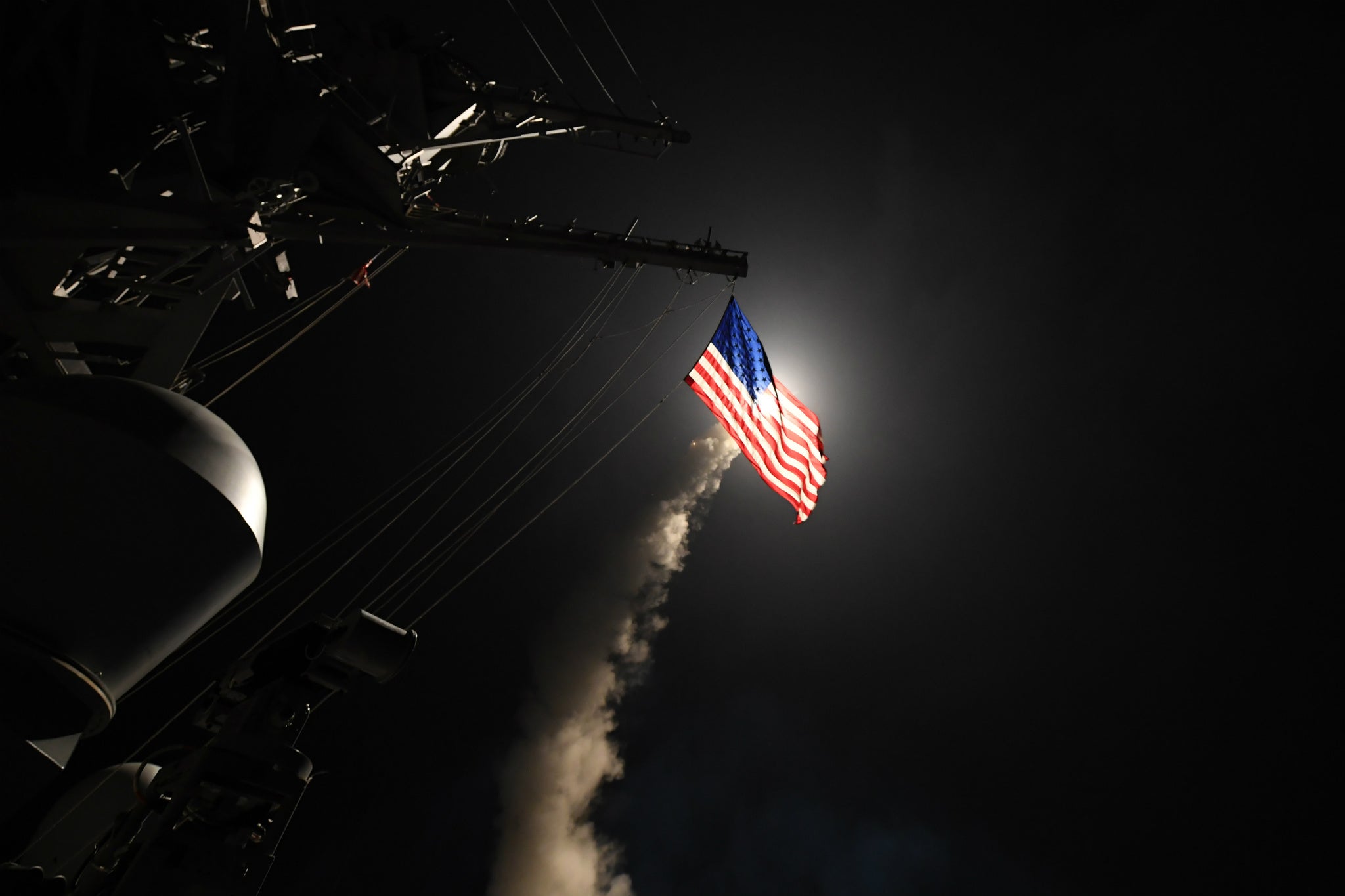The likelihood of airstrikes against Syria raises prospect of more aggressive posture by Trump
Incoherence on Syria has been the mark of Mr Trump’s foreign policy

Your support helps us to tell the story
From reproductive rights to climate change to Big Tech, The Independent is on the ground when the story is developing. Whether it's investigating the financials of Elon Musk's pro-Trump PAC or producing our latest documentary, 'The A Word', which shines a light on the American women fighting for reproductive rights, we know how important it is to parse out the facts from the messaging.
At such a critical moment in US history, we need reporters on the ground. Your donation allows us to keep sending journalists to speak to both sides of the story.
The Independent is trusted by Americans across the entire political spectrum. And unlike many other quality news outlets, we choose not to lock Americans out of our reporting and analysis with paywalls. We believe quality journalism should be available to everyone, paid for by those who can afford it.
Your support makes all the difference.There are likely to be air strikes by the US, with France and possibly Britain joining, after Donald Trump tweeted there will be a “big price to pay” for the chemical attack in Syria.
The strikes, by themselves, will achieve nothing much in a civil war now nearing its bloody end. But they can lead, some Western officials hope, to the beginning of a new, more aggressive, posture by Washington.
There has been the usual incoherence on Syria which has been the mark of Mr Trump’s foreign policy. On this occasion this may have contributed to the dreadful scenes which unfolded in Douma.
Last week the US President told his commanders that he wanted to pull troops out of the country as soon as possible. This is likely to have been have been viewed in Damascus as a firm signal of American disengagement and emboldened the regime to carry out the gas attack.
The US President charged in his tweet that “President Putin, Russia and Iran are responsible for backing Animal Assad.”
This was the first time that Mr Trump had criticised Mr Putin by name since he got to the White House, allegedly with the Kremlin’s help. But Iran has long been a target for him. It may not be coincidental that the Israeli airstrikes at the Tiyas airbase in Homs, with Iranians among the dead, took place soon afterwards.
There is a strategy of sorts behind the Israeli action. Benjamin Netanyahu’s government has been complaining about Iran, which is sees as its existential enemy, supposedly entrenching forces in Syria.
Israel has carried out similar attacks in Syria in the past, and will almost certainly do so in the future. Mr Trump’s tweeted threat of a strike, however, came just after he saw the images in the aftermath. This is not strategy, but foreign policy being made on the hoof.
The fact, unpalatable as it is, remains that the Assad regime and its allies have achieved its aim in carrying out the gas attack.
The rebel group Jaish al-Islam has agreed to a Russian deal it had previously rejected to leave Douma. It also agreed to another part of the deal, the freeing of all the prisoners it held. Western air strikes now will not now return Douma back to the opposition.
The Trump administration has, of course, carried out missile strikes on Syria before. On 7 April last year around 60 Tomahawk missiles were fired into the Sharyat airbase in Homs after warplanes from there were said to have carried out a sarin attack on the town of Khan Sheikhun.
That did nothing to change the course of the conflict on the ground. At home, Republicans were divided between those who exulted in contrasting the action taken by a Republican president after the prevarications of Barack Obama following the Ghouta chemical attack in 2013.
But there were also those in his support base, and his chief strategist, Steve Bannon, who complained that it was exactly the kind of foreign adventures Mr Trump had promised to avoid in his presidential campaign.
Mr Bannon has now gone, part of the mass exodus of the original Trump team from the White House. The new national security advisor, starting at his post today, takes pride in being a superhawk. John Bolton, who replaced Lt Gen HR McMaster, may never have faced a shot fired in anger (he had publicly acknowledged his successful efforts to avoid the Vietnam draft) but has been a fervent proponent of US military action in a variety of places and remains a believer in the Iraq War.
Meanwhile Rex Tillerson, whose desire for caution so irked Mr Trump, has been replaced by Mike Pompeo, another hardliner.
There are those among America’s allies, Israel and others, including some senior UK officials, who hope the newly arrived hawks in the US administration, especially Mr Bolton, will persuade Mr Trump to not only stop the withdrawl of US forces from Syria but increase numbers and restart the training of rebel fighters.
The argument for taking a more aggressive approach is that not only will it counter the brutal acts of the Assad regime, but limit Russian and Iranian influence in the region.
Mr Bolton, who has been a vocal cheerleader for Nato’s expansion to the Russian border and whose published works include To Stop Iran’s Bomb, Bomb Iran, could well be persuaded to press for this new approach. He may also be able to persuade Mr Trump, increasingly free of moderating influence in the White House, to take this on board as policy, if only for a while. This kind of volte-face is, after all, has nothing unusual in the presidency of Donald Trump.
Join our commenting forum
Join thought-provoking conversations, follow other Independent readers and see their replies
Comments